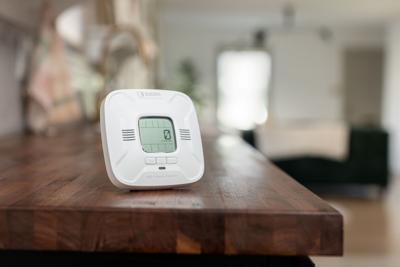SPRINGFIELD, Ill. (WAND) - November is National Carbon Monoxide Awareness Month.
The Office of the Illinois State Fire Marshal is raising awareness, urging everyone to recognize the dangers of CO poisoning.
Carbon Monoxide poisoning kills hundreds and sickens thousands every year across the country.
In 2024, Illinois fire departments responded to 9,860 carbon monoxide related calls across Illinois.
According to the National Carbon Monoxide Awareness Association, emergency rooms across the U.S. see more than 100,000 visits each year due to CO exposure. Over 14,000 people are hospitalized annually, and approximately 1,200 people die each year from carbon monoxide poisoning.
“Carbon monoxide is a silent and deadly threat that can strike without warning! This threat increases during the colder months as we turn on our furnaces to stay warm,” said Illinois State Fire Marshal Michele Pankow. “Every home and business should have working CO alarms and ensure all fuel-burning appliances are properly maintained. Awareness, prevention, and early detection save lives so don’t wait until it’s too late.”
Carbon monoxide is a toxic gas produced by fuel-burning devices like furnaces, generators, fireplaces, grills, and vehicles. CO has no color, no odor, and no taste. It is virtually undetectable without a working alarm.
Exposure to carbon monoxide can lead to both short-term and long-term health effects. High concentrations can be deadly within minutes. Prolonged exposure to lower levels can cause serious and lasting health problems.
Symptoms of CO poisoning can include:
- Headache, nausea, vomiting
- Dizziness and confusion
- Shortness of breath
- Weakness, fatigue, or blurred vision
- Sleepiness, loss of muscle control, and unconsciousness
Protect Yourself and Your Loved Ones: Carbon Monoxide Safety Tips
- Install CO alarms: in your home, garage, shop, or man cave — especially near fuel-burning appliances and sleeping areas.
- Take a portable CO alarm when traveling: most hotels are not required to have them.
- Know the sound: CO alarms beep four times in a row; fire alarms beep three times.
- Test alarms monthly, replace batteries as needed, and follow the manufacturer’s replacement schedule.
- Schedule annual inspections for furnaces, chimneys, and fireplaces.
- Use generators safely — keep them at least 20 feet from any building, using extension cords if needed. Never use them inside.
- Never heat your home with a gas oven or range.
- Ventilate your garage: Don’t run vehicles inside, even with the door open. Back them out of the garage.
- Keep exhaust vents clear — including your home’s appliances and your car’s tailpipe.
To learn more about CO safety visit sfm.illinois.gov.
Top Stories:
Oreana man gets 10 years for sexually abusing 15-year-old girl
ISP says Decatur man possessed over 3,800 child porn images
How to Watch | (17) Illinois vs Florida Gulf Coast
Former Northwestern coach Pat Fitzgerald says he's been received well in conversations with schools
Copyright 2025. WAND TV. All rights reserved.











